Ethical Dilemma in Child Refusing to Drink Milk
VerifiedAdded on 2023/03/30
|5
|879
|291
AI Summary
This article discusses the ethical dilemma faced by teachers when a child refuses to drink milk. It explores the importance of milk in a child's diet and the responsibility of teachers to promote the child's well-being. The article suggests alternative solutions and emphasizes the need for effective communication with the child and parents.
Contribute Materials
Your contribution can guide someone’s learning journey. Share your
documents today.
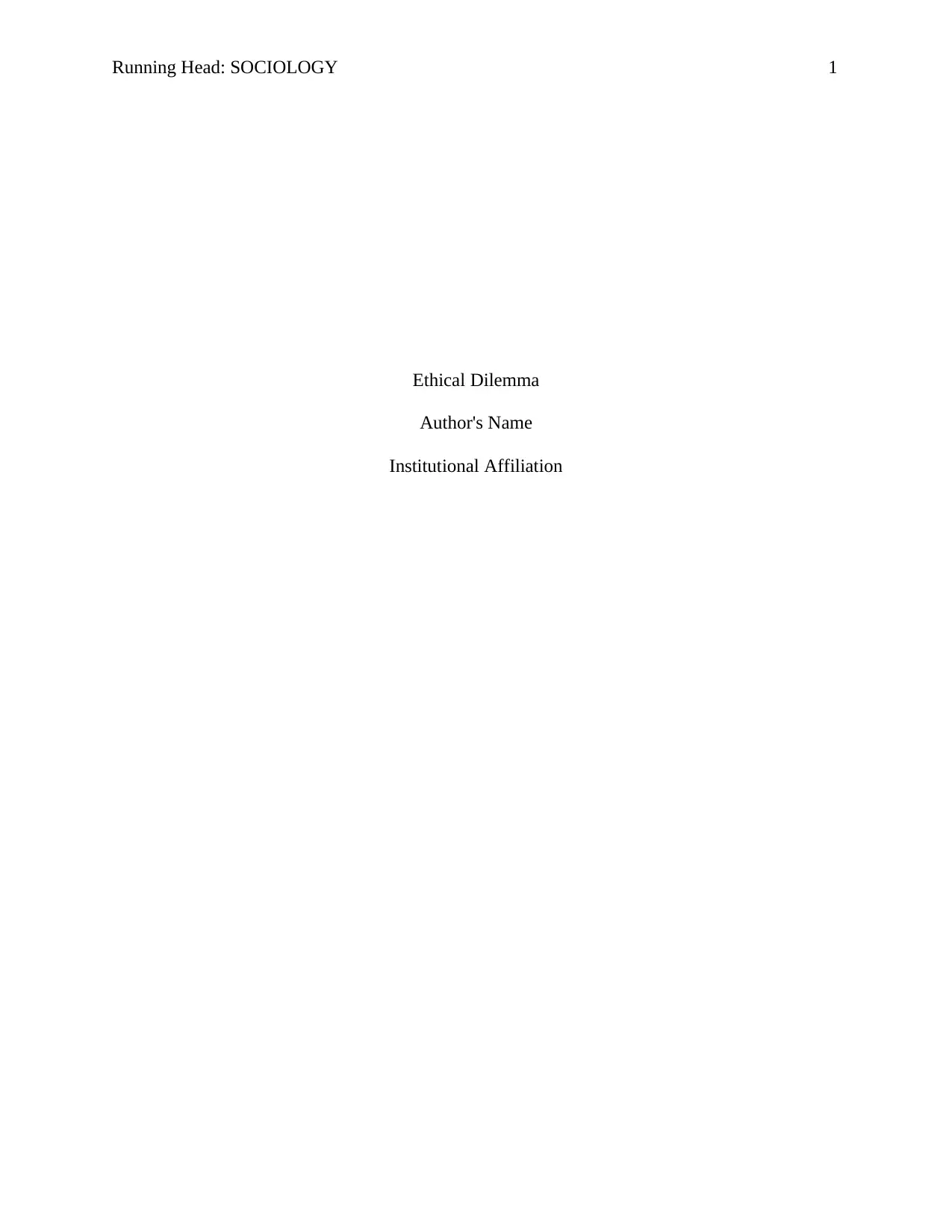
Running Head: SOCIOLOGY 1
Ethical Dilemma
Author's Name
Institutional Affiliation
Ethical Dilemma
Author's Name
Institutional Affiliation
Secure Best Marks with AI Grader
Need help grading? Try our AI Grader for instant feedback on your assignments.
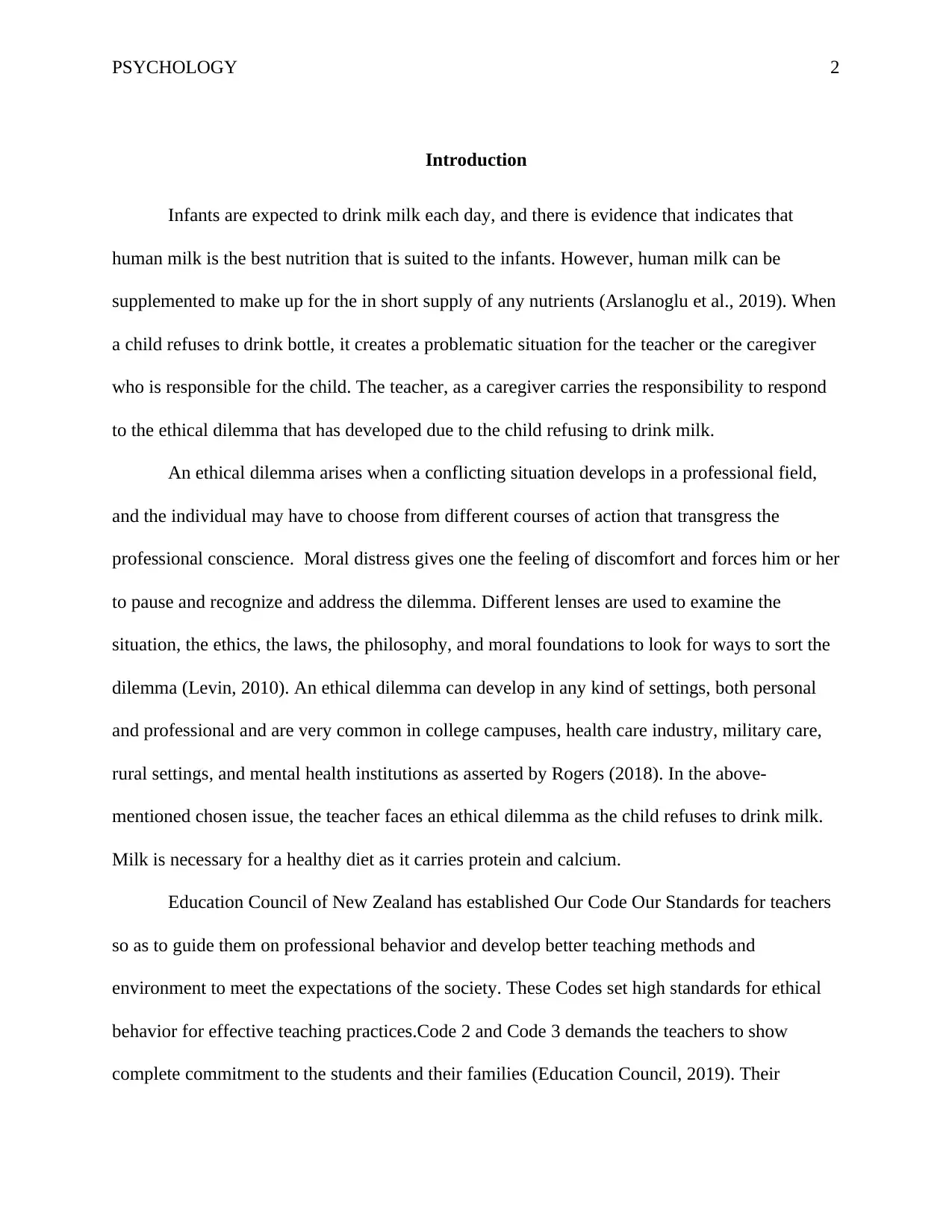
PSYCHOLOGY 2
Introduction
Infants are expected to drink milk each day, and there is evidence that indicates that
human milk is the best nutrition that is suited to the infants. However, human milk can be
supplemented to make up for the in short supply of any nutrients (Arslanoglu et al., 2019). When
a child refuses to drink bottle, it creates a problematic situation for the teacher or the caregiver
who is responsible for the child. The teacher, as a caregiver carries the responsibility to respond
to the ethical dilemma that has developed due to the child refusing to drink milk.
An ethical dilemma arises when a conflicting situation develops in a professional field,
and the individual may have to choose from different courses of action that transgress the
professional conscience. Moral distress gives one the feeling of discomfort and forces him or her
to pause and recognize and address the dilemma. Different lenses are used to examine the
situation, the ethics, the laws, the philosophy, and moral foundations to look for ways to sort the
dilemma (Levin, 2010). An ethical dilemma can develop in any kind of settings, both personal
and professional and are very common in college campuses, health care industry, military care,
rural settings, and mental health institutions as asserted by Rogers (2018). In the above-
mentioned chosen issue, the teacher faces an ethical dilemma as the child refuses to drink milk.
Milk is necessary for a healthy diet as it carries protein and calcium.
Education Council of New Zealand has established Our Code Our Standards for teachers
so as to guide them on professional behavior and develop better teaching methods and
environment to meet the expectations of the society. These Codes set high standards for ethical
behavior for effective teaching practices.Code 2 and Code 3 demands the teachers to show
complete commitment to the students and their families (Education Council, 2019). Their
Introduction
Infants are expected to drink milk each day, and there is evidence that indicates that
human milk is the best nutrition that is suited to the infants. However, human milk can be
supplemented to make up for the in short supply of any nutrients (Arslanoglu et al., 2019). When
a child refuses to drink bottle, it creates a problematic situation for the teacher or the caregiver
who is responsible for the child. The teacher, as a caregiver carries the responsibility to respond
to the ethical dilemma that has developed due to the child refusing to drink milk.
An ethical dilemma arises when a conflicting situation develops in a professional field,
and the individual may have to choose from different courses of action that transgress the
professional conscience. Moral distress gives one the feeling of discomfort and forces him or her
to pause and recognize and address the dilemma. Different lenses are used to examine the
situation, the ethics, the laws, the philosophy, and moral foundations to look for ways to sort the
dilemma (Levin, 2010). An ethical dilemma can develop in any kind of settings, both personal
and professional and are very common in college campuses, health care industry, military care,
rural settings, and mental health institutions as asserted by Rogers (2018). In the above-
mentioned chosen issue, the teacher faces an ethical dilemma as the child refuses to drink milk.
Milk is necessary for a healthy diet as it carries protein and calcium.
Education Council of New Zealand has established Our Code Our Standards for teachers
so as to guide them on professional behavior and develop better teaching methods and
environment to meet the expectations of the society. These Codes set high standards for ethical
behavior for effective teaching practices.Code 2 and Code 3 demands the teachers to show
complete commitment to the students and their families (Education Council, 2019). Their
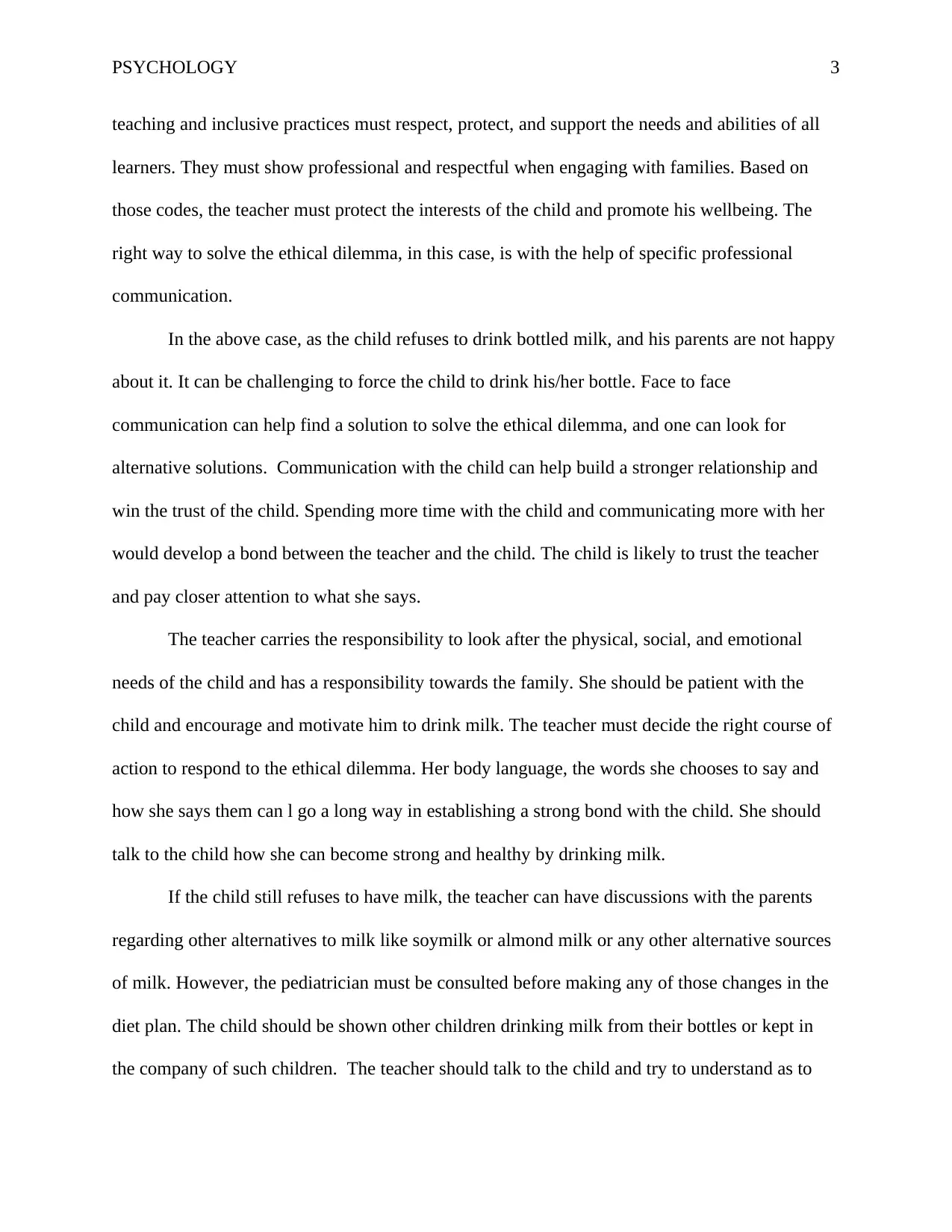
PSYCHOLOGY 3
teaching and inclusive practices must respect, protect, and support the needs and abilities of all
learners. They must show professional and respectful when engaging with families. Based on
those codes, the teacher must protect the interests of the child and promote his wellbeing. The
right way to solve the ethical dilemma, in this case, is with the help of specific professional
communication.
In the above case, as the child refuses to drink bottled milk, and his parents are not happy
about it. It can be challenging to force the child to drink his/her bottle. Face to face
communication can help find a solution to solve the ethical dilemma, and one can look for
alternative solutions. Communication with the child can help build a stronger relationship and
win the trust of the child. Spending more time with the child and communicating more with her
would develop a bond between the teacher and the child. The child is likely to trust the teacher
and pay closer attention to what she says.
The teacher carries the responsibility to look after the physical, social, and emotional
needs of the child and has a responsibility towards the family. She should be patient with the
child and encourage and motivate him to drink milk. The teacher must decide the right course of
action to respond to the ethical dilemma. Her body language, the words she chooses to say and
how she says them can l go a long way in establishing a strong bond with the child. She should
talk to the child how she can become strong and healthy by drinking milk.
If the child still refuses to have milk, the teacher can have discussions with the parents
regarding other alternatives to milk like soymilk or almond milk or any other alternative sources
of milk. However, the pediatrician must be consulted before making any of those changes in the
diet plan. The child should be shown other children drinking milk from their bottles or kept in
the company of such children. The teacher should talk to the child and try to understand as to
teaching and inclusive practices must respect, protect, and support the needs and abilities of all
learners. They must show professional and respectful when engaging with families. Based on
those codes, the teacher must protect the interests of the child and promote his wellbeing. The
right way to solve the ethical dilemma, in this case, is with the help of specific professional
communication.
In the above case, as the child refuses to drink bottled milk, and his parents are not happy
about it. It can be challenging to force the child to drink his/her bottle. Face to face
communication can help find a solution to solve the ethical dilemma, and one can look for
alternative solutions. Communication with the child can help build a stronger relationship and
win the trust of the child. Spending more time with the child and communicating more with her
would develop a bond between the teacher and the child. The child is likely to trust the teacher
and pay closer attention to what she says.
The teacher carries the responsibility to look after the physical, social, and emotional
needs of the child and has a responsibility towards the family. She should be patient with the
child and encourage and motivate him to drink milk. The teacher must decide the right course of
action to respond to the ethical dilemma. Her body language, the words she chooses to say and
how she says them can l go a long way in establishing a strong bond with the child. She should
talk to the child how she can become strong and healthy by drinking milk.
If the child still refuses to have milk, the teacher can have discussions with the parents
regarding other alternatives to milk like soymilk or almond milk or any other alternative sources
of milk. However, the pediatrician must be consulted before making any of those changes in the
diet plan. The child should be shown other children drinking milk from their bottles or kept in
the company of such children. The teacher should talk to the child and try to understand as to
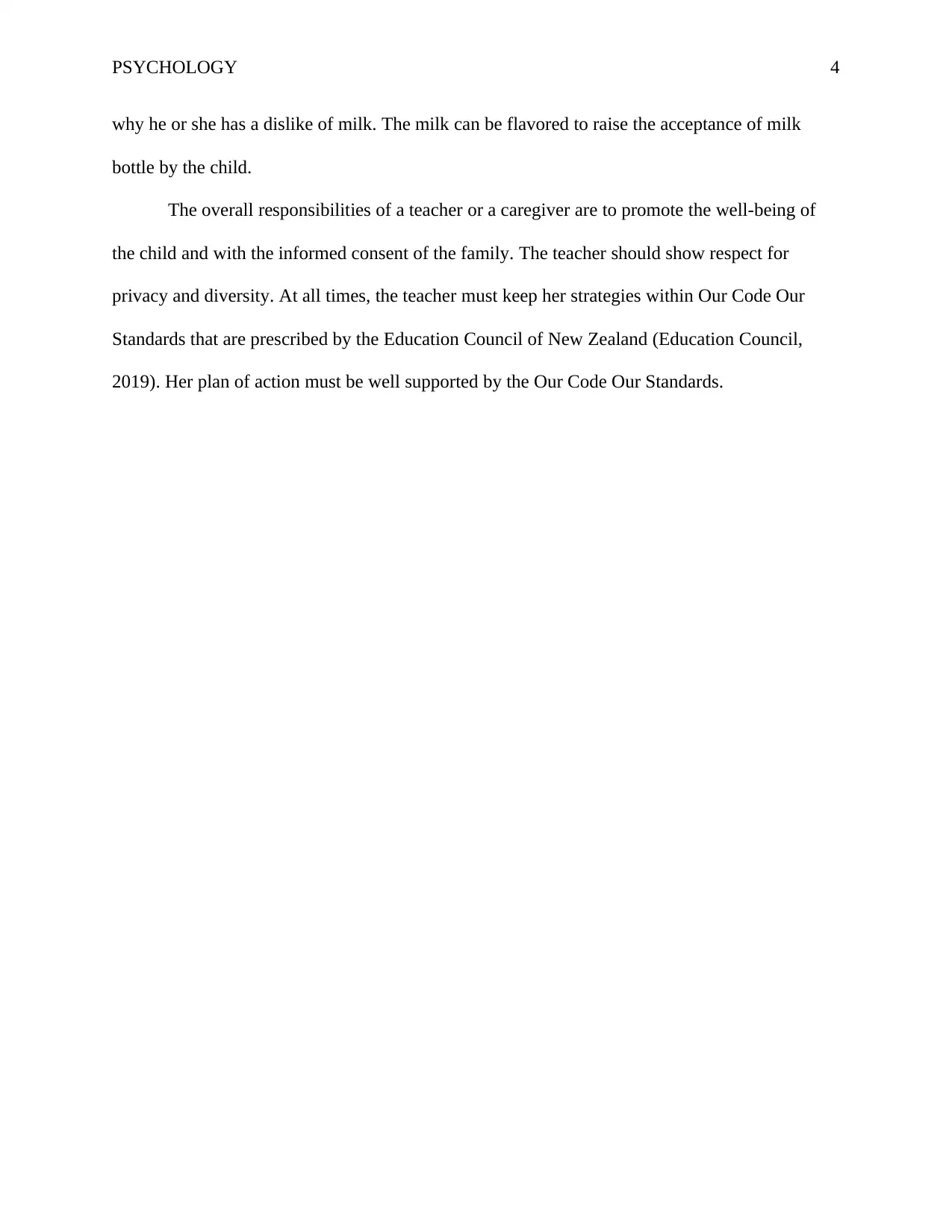
PSYCHOLOGY 4
why he or she has a dislike of milk. The milk can be flavored to raise the acceptance of milk
bottle by the child.
The overall responsibilities of a teacher or a caregiver are to promote the well-being of
the child and with the informed consent of the family. The teacher should show respect for
privacy and diversity. At all times, the teacher must keep her strategies within Our Code Our
Standards that are prescribed by the Education Council of New Zealand (Education Council,
2019). Her plan of action must be well supported by the Our Code Our Standards.
why he or she has a dislike of milk. The milk can be flavored to raise the acceptance of milk
bottle by the child.
The overall responsibilities of a teacher or a caregiver are to promote the well-being of
the child and with the informed consent of the family. The teacher should show respect for
privacy and diversity. At all times, the teacher must keep her strategies within Our Code Our
Standards that are prescribed by the Education Council of New Zealand (Education Council,
2019). Her plan of action must be well supported by the Our Code Our Standards.
Secure Best Marks with AI Grader
Need help grading? Try our AI Grader for instant feedback on your assignments.
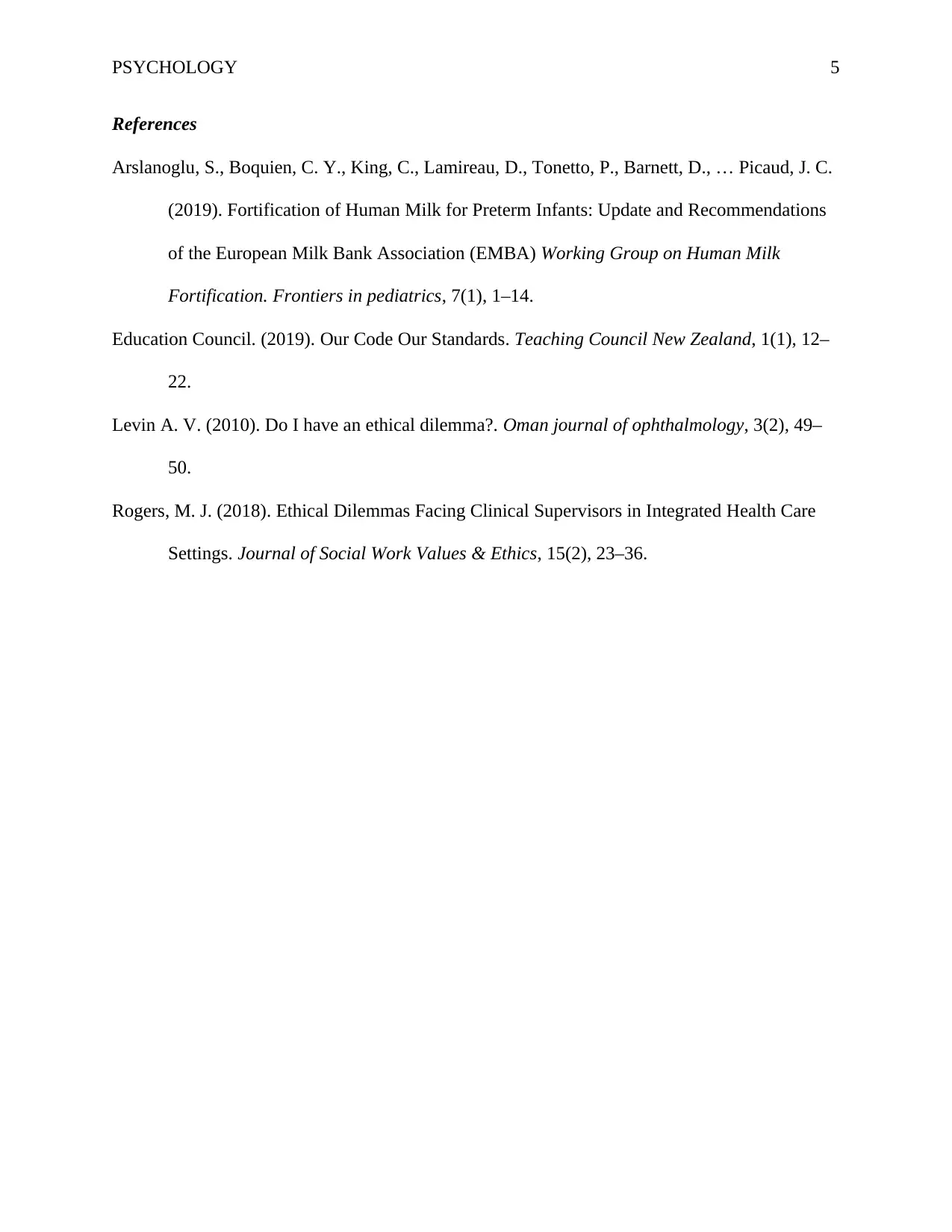
PSYCHOLOGY 5
References
Arslanoglu, S., Boquien, C. Y., King, C., Lamireau, D., Tonetto, P., Barnett, D., … Picaud, J. C.
(2019). Fortification of Human Milk for Preterm Infants: Update and Recommendations
of the European Milk Bank Association (EMBA) Working Group on Human Milk
Fortification. Frontiers in pediatrics, 7(1), 1–14.
Education Council. (2019). Our Code Our Standards. Teaching Council New Zealand, 1(1), 12–
22.
Levin A. V. (2010). Do I have an ethical dilemma?. Oman journal of ophthalmology, 3(2), 49–
50.
Rogers, M. J. (2018). Ethical Dilemmas Facing Clinical Supervisors in Integrated Health Care
Settings. Journal of Social Work Values & Ethics, 15(2), 23–36.
References
Arslanoglu, S., Boquien, C. Y., King, C., Lamireau, D., Tonetto, P., Barnett, D., … Picaud, J. C.
(2019). Fortification of Human Milk for Preterm Infants: Update and Recommendations
of the European Milk Bank Association (EMBA) Working Group on Human Milk
Fortification. Frontiers in pediatrics, 7(1), 1–14.
Education Council. (2019). Our Code Our Standards. Teaching Council New Zealand, 1(1), 12–
22.
Levin A. V. (2010). Do I have an ethical dilemma?. Oman journal of ophthalmology, 3(2), 49–
50.
Rogers, M. J. (2018). Ethical Dilemmas Facing Clinical Supervisors in Integrated Health Care
Settings. Journal of Social Work Values & Ethics, 15(2), 23–36.
1 out of 5
Related Documents
Your All-in-One AI-Powered Toolkit for Academic Success.
+13062052269
info@desklib.com
Available 24*7 on WhatsApp / Email
![[object Object]](/_next/static/media/star-bottom.7253800d.svg)
Unlock your academic potential
© 2024 | Zucol Services PVT LTD | All rights reserved.





